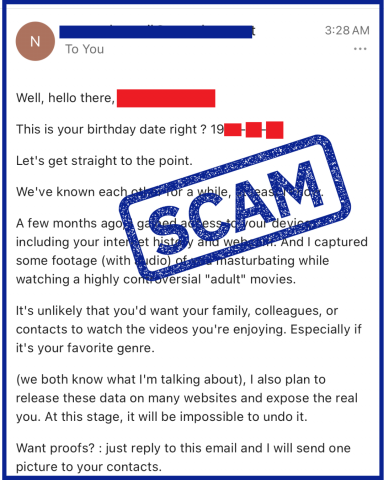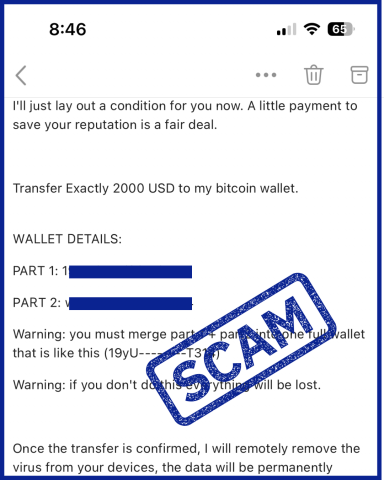The National Anti-Scam Centre has recently received hundreds of reports of people targeted by cyber criminals who falsely claim to have compromising images or videos of the recipient by hacking into their webcam or computer.
How to spot the bulk email extortion scam
You receive an unexpected contact from someone claiming to have compromising sexual information about you.
The scammer threatens you and tells you to pay money, otherwise the information will be released.
You are pressured to act quickly to avoid embarrassment and potential reputational damage.
How the bulk email extortion scam works
Scammers send you an email falsely claiming that your computer or webcam has been hacked and that compromising sexual images or videos of you have been recorded.
The scammers threaten to release this compromising material if they aren’t paid via cryptocurrency platforms, as these types of transactions provide some degree of anonymity, and unlike traditional finance, involve transactions that are less likely to be recouped or reversed.
The emails include your birth date, full name and, in some cases, birth date, mobile number and home address. This makes them seem more legitimate.
Here is an example email:


(Source: National Anti-Scam Centre)
What to do if you receive one of these emails
The National Anti-Scam Centre says if people receive emails like this, they should not respond too or engage with the cybercriminals in any way or make any payments.
Delete such emails and contact a computer specialist if you have concerns about the security of your device.
There is no evidence that the criminals behind these emails really do have access to the victim’s webcam or computer.
The personal details are likely to have been sourced from previous public data breaches.
What to do if you have encountered a scam
If you believe you may have been a victim or lost money to a scam, it’s important to notify your financial institution as soon as possible.
Australian Mutual Bank members can contact our Fraud Team by calling 13 61 91 or by emailing info@australianmutual.bank.
Seek support from IDCARE (a free government-funded service) who can help you develop a response plan to limit the damage. IDCARE will never contact you out of the blue.
Help others and keep authorities in the know by reporting the scam to Scamwatch.
Beware of follow up scams, particularly ones promising to help you get your money back. One in three victims of a scam have been scammed more than once according to Scamwatch.
If you or someone you know has been impacted and may need ongoing help, there are support services available. These avenues of support are available to help, listen and believe.
For more advice on how to avoid scams and what to do if you or someone you know is a victim of a scam, see our Security Advice section or visit the Scamwatch website.
Sources:
https://www.nasc.gov.au/news/warning-as-major-bulk-email-extortion-scam-campaign-targets-australians






